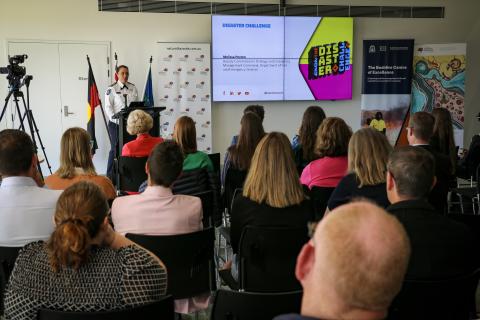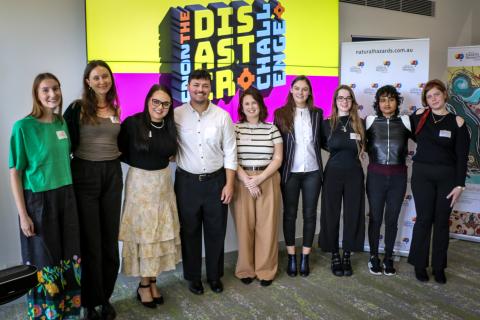


The Disaster Challenge is a national challenge to encourage new ideas, new thinking and new research. After assessing entries, three finalists were selected and each presented their innovate idea to address the wicked problem at the Disaster Challenge Final.
The Disaster Challenge Final took place at 10am-12pm AWST, 4 October 2024, hosted by the Department of Fire and Emergency Services at the Bushfire Centre of Excellence, Mandurah, Western Australia.

At the heart of society’s approach to disaster resilience are the notions of shared responsibility and community-led action, backed by scientific evidence and lived experience. This requires informed, trusted and effective relationships between people and organisations involved in preventing, preparing, responding and recovering from disasters, including climate change.
There are many ways to build and sustain mutual trust, however trust can be eroded by the decisions and actions of people, communities and organisations. In its place people, communities and organisations can be disconnected, communication can break down and cynicism, doubt, isolation and non-participation can grow.
When trust is challenged the foundations of disaster resilience are threatened.
In a world where trust is both vital and fragile, how can we build and sustain trust across our whole society to drive the collective and coordinated actions that are fundamental to reducing the risks and impacts of disasters, and strengthening the safety, sustainability and resilience of all Australians?

Photo: (from left) Natalie Oliver, Lillian Norris, Alison Sheaves, Craig Ridep-Morris, Madison Green, Alexandra Gunn, Hannah Waldron, Curie Thota, Anika Hill
Craig Ridep-Morris (postgraduate student, James Cook University), Alison Sheaves (postgraduate student, James Cook University, Madison Green (postgraduate student, James Cook University)
Through the development of a community-centred, human behaviour theory-informed disaster information dissemination protocol, trust in emergency and disaster management will be improved and community disaster-resilience built. Optimising the advertisement and dissemination of existing information resources, the protocol will address critical elements that improve understanding and prompt protective actions, as well as providing community-accessible disaster information.
Watch Madi, Craig and Ali's pitch and their discussion on the winning concept below.
Natalie Oliver (early career researcher, Queensland Fire Department), Alexandra Gunn (postgraduate student, La Trobe University and Queensland Fire Department), Lillian Norris (postgraduate student, University of Queensland)
Home Insurance Risk Reduction Options (HIRRO) empowers homeowners to reduce risk and increase resilience through a range of practical home improvements that lead to real and transparent reductions in insurance premiums while also building trust. Through the integration of risk data and AI, HIRRO will inform homeowners about the most beneficial, risk-reducing improvements they can make to their homes, leading to insurance premium reductions in an accessible and transparent process and increasing trust.
Watch the team's pitch below.
Hannah Waldron (undergraduate student, University of Western Australia), Curie Thota (postgraduate student, University of Western Australia), Anika Hill (undergraduate student, Murdoch University)
Using a two-pronged approach, Project OutHeat fosters community trust and action during heatwaves. Nag-Your-Neighbours encourages community members to check in on those around them during heatwaves, while Hydraid delivers mobile heatwave relief in metropolitan and regional Australia, providing essential aid to those without support/resources during extreme weather.
Watch the team's pitch below.
Learn more about the Disaster Challenge.